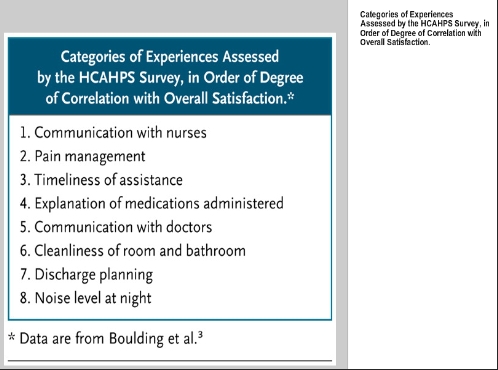Metrics Masters
Are your physician/providers and practice managers masters of their experience metrics?
Metrics Masters is a short course designed to delve into what is really driving patient perceptions. Armed with this knowledge, focused improvement occurs. The program is tailored to your specific patient experience vendor and includes the technical training to use their system, as well as understanding what each measure means and, more importantly, what behaviors drive improvement!
Top Drivers of Patient Satisfaction
1. Communication with nurses: The level of satisfaction with communication between nurses and patients has a high degree of correlation with overall satisfaction. Effective nurse-patient communication is crucial for understanding and addressing patients' needs, which directly impacts their satisfaction.
2. Communication with doctors: Similar to communication with nurses, the level of satisfaction with communication between doctors and patients has a significant correlation with overall satisfaction. Patients rely on effective communication with doctors to understand their conditions, treatment options, and to build trust in their healthcare provider's expertise.
3. Pain management: The ability to effectively manage pain is an important aspect of patient care. The degree of satisfaction with pain management strongly influences overall satisfaction. Adequate pain control contributes to patients' comfort, well-being, and their perception of the quality of care received.
4. Explanation of medications: Ensuring patients receive clear and understandable information about their medications is crucial for safety and adherence. A satisfactory explanation of medications correlates positively with patients' overall satisfaction.
5. Cleanliness of room: The cleanliness and overall hygiene of the patient's room reflect the attention to infection control measures and overall quality of the healthcare facility. Patient satisfaction with the cleanliness of their room has a moderate degree of correlation with overall satisfaction.

6. Timeliness: Timeliness refers to the promptness at which healthcare services are provided, including response times and waiting periods. While it is important for patient experience, its correlation with overall satisfaction may not be as strong as the previous categories.
7. Discharge planning: Discharge planning involves preparing patients for a safe transition from the hospital to home or further care. While an essential component of patient experience, its correlation with overall satisfaction may be weaker compared to other categories.
8. Noise level at night: Although considered important for patient comfort and calmness, the correlation between noise level at night and overall satisfaction tends to be weaker compared to other categories. While excessive noise can disrupt sleep and recovery, it may not be as central to overall satisfaction as other factors.
